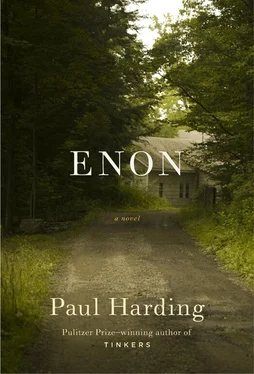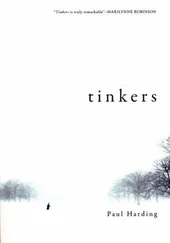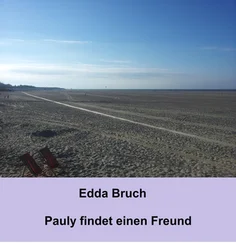When that instant passed, whether it was between us or in my mind alone, Susan said, “Let me get some clothes on,” and rushed back to the bedroom.
Susan drove me to the regional hospital and sat with me in the emergency room for two hours, crying. My hand hurt terribly and I was exhausted and I felt humiliated for us. Not only did we have to bear our only child’s death, but we had to do so in front of a room full of miserable strangers. I tried to comfort myself by looking at the faces of the other people in the emergency room. There was an old couple holding hands. The wife had a mask over her face, with a tube running from it to an oxygen tank. Her skin was gray. Her husband held her hand and stared at the floor. There was a young kid, maybe fourteen years old, with what looked like his older brother, or maybe a young uncle, who was holding a bloody dish towel to the top of the boy’s head. The brother or uncle kept asking the boy how he was doing, saying the doctor was going to see him soon. The boy was woozy and said “All right” every time his brother or uncle spoke to him. I tried to think about whom it was these people had lost. What mothers and sisters and best friends. Susan was slouched in her chair, her clenched left fist pushed up against her mouth. Her breathing was rapid and shallow, like she was trying to breathe fast enough to keep ahead of sobbing. She gazed across the emergency room through the glass doors to the roundabout where people were dropping patients off. She shook her head as if she were saying no, no, no over and over. Tears drained from the corners of her eyes. She wiped her face and looked at me. I smiled at her but she didn’t smile back. She shook her head no again and put her fist back to her mouth.
IT TOOK THREE MORE hours at the hospital to have X-rays and get my hand set in a cast. I spent the next day lying on the living room couch, trying to sleep but unable to. I could not sleep that night, either, despite the painkillers the doctor had prescribed, and left our bed for the couch, where I sat semiconscious in the dark, having nightmares from which I periodically started, only to find the waking world worse than my dreams.
Susan’s older sister called at nine the next morning and they talked for half an hour. When the call ended, Susan came into the living room.
“How do you feel?” she asked.
“Oh, you know,” I said. “Awful.”
“Do you think you can get up today and maybe help me with some things?”
“I’ll try. I didn’t sleep at all. My hand is killing me. What’d your sister have to say?”
“She — they — my family — wants us to go out there and visit.”
“What’d you say?”
“I said I’d talk about it with you.”
It was Tuesday morning, when I normally would have been mowing lawns and Sue would have been at the elementary school in Salem, where she taught reading. A heavy wind rumbled outside, through the trees, and broke against the house in gusts. The mailman came up the walkway and I heard the squeak of the mailbox opening and closing.
I knew it was all wrong, that I was snipping the single, thin thread by which our marriage was barely still suspended. But I felt it was my obligation. I’d spent the week since the funeral lying on the couch in a daze. I’d lost my mind and punched a hole in the wall and broken my hand so that I couldn’t work or do much of anything that needed doing. I thought, Poor Sue. She shouldn’t have to deal with me. I’m no good for her, I thought. She’s being loving and gracious because she has a good heart, but I just can’t ask her to stick this out.
“Well,” I said. “How about you go? I can’t. I feel like I have to stay here. But you’ve got another week’s leave. Why don’t you go?”
Sue stared at me for a moment. It’s the last time I remember the two of us looking each other in the eye.
She said, “I need to think about it.”
The teakettle whistled in the kitchen. Susan went to make herself tea. I remained on the couch and listened to the cupboard door open and the mugs clink against each other as Susan took one out and the door slap shut and another door open and the rustle and scrape of her opening the box of tea bags and that door slap shut and then the utensil drawer opening and Susan getting a spoon.
“Sue, I think that’s good,” I called to her. “Your sisters and your mom, and your dad.”
SUSAN HAD A BENIGN aloofness that made her irresistible from the moment I saw her. She was a mystery and remained that way for the duration of our marriage. We were at school the first time we met. She and three of her friends visited the house I had just moved into with four other guys because she knew one of them. We all sat across from one another in old flea market chairs and a couch left out on the curb that we’d carried home. It was a rainy, late, luminescent August afternoon and I chain-smoked cigarettes and we talked about music and art and books and I exaggerated my enthusiasm for anything Susan mentioned that I liked, too. She poured red wine from a green jug into a blue glass. When she raised the glass to her mouth, the daylight lit the glass purple and it seemed as if her eyes turned the same color. When she lowered the glass, her eyes returned to the silvery turquoise of her scarf. She wiped the wine from her top lip and smiled at what I’d just said, but more to herself than me, and I knew that I’d never get through to her, really, fully, and that if I did it’d dispel what was already enchanting me anyway, and that made everything impossible, but it also — or especially — made her all the more attractive. When she stood up to leave with her friends a couple hours later, she stretched her arms over her head and looked out the window and her eyes turned the gray blue of the thunderclouds gathering over the vacant fairgrounds across the street.
Since I’d been a young kid I’d loved books and read constantly. I loved mysteries and horror stories and books on history and art and science and music, everything. The bigger the book, the better; I deliberately found the thickest novels I could, for the pleasure of lingering in other worlds and other people’s lives for as long as possible. I borrowed six books a week, the limit, from the library and devoured potboilers and war stories and histories of the Apollo space program and Russian novels I could make neither heads nor tails of and it was all thrilling. What I loved most was how the contents of each batch of books mixed up with one another in my mind to make ideas and images and thoughts I’d never have imagined possible.
School was another matter. I was a terrible student and regularly failed assignments and wrote pathetic essays and missed due dates. The only college I was accepted to was the state university, and that just barely. When I met Susan, I’d been on academic probation for a semester, and I dropped out the following fall. Susan and I moved in together while she finished her degree and I painted houses and mowed lawns and shoveled snow.
We moved to Enon when Sue graduated. By then, she was already three months pregnant. I went to work painting houses full-time for one of my grandfather’s neighbors, a guy named Louis, who’d hired me for summers in high school. Louis had moved into a converted boardinghouse across the street from my grandparents with his wife and four kids a few years earlier. My grandparents had been friends for decades with the woman who’d lived there and let rooms before, mostly to Enon’s bachelor civil servants: firemen, cops, mail carriers. When she died and Louis bought the house, he renovated and repainted it by himself. My grandfather liked to stand around in the side yard and pass the time talking about the neighborhood while Louis replaced shingles or primed the doors. Louis always called my grandfather “Mr. Crosby” and shoveled his driveway and the footpath to the front door whenever it snowed, “Because we’re neighbors now, Mr. Crosby, and that’s what neighbors do.”
Читать дальше












